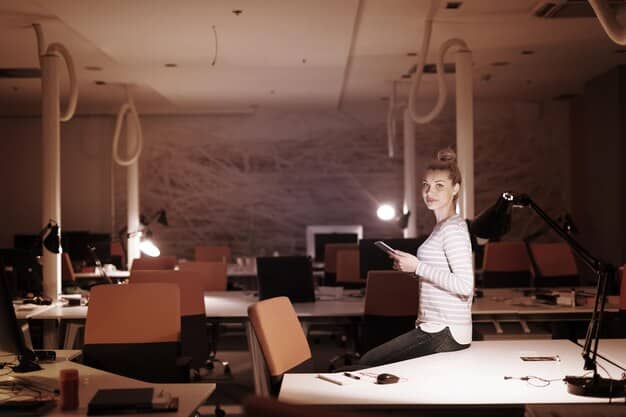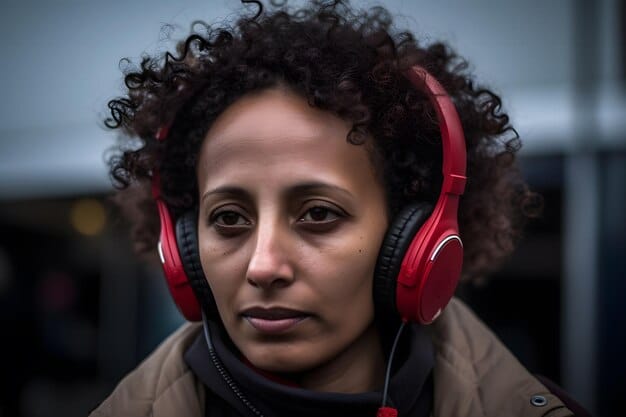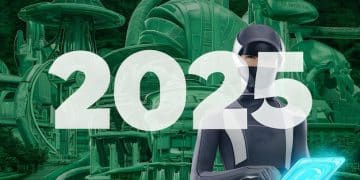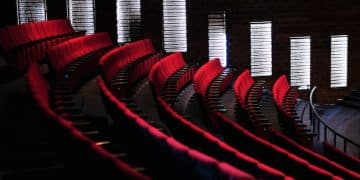Period Drama Soundtracks in 2025: Enhancing the Viewing Experience

Period piece drama soundtracks significantly enhance the viewing experience in 2025 by creating an immersive atmosphere, amplifying emotions, and providing historical context, thereby enriching storytelling and viewer engagement.
The evocative power of music has always been integral to storytelling, but in 2025, the impact of period piece drama soundtracks: how music enhances the viewing experience in 2025, rises to new heights, seamlessly transporting audiences to bygone eras.
The Evolution of Soundtracks in Period Piece Dramas
Soundtracks in period piece dramas have evolved significantly, moving beyond simple background music to become an integral part of the storytelling. In the past, traditional orchestral scores were the norm, but modern approaches incorporate diverse musical styles to enhance the viewing experience.
The use of music in period dramas is not just about filling the silence; it’s about creating a mood, setting a tone, and even providing commentary on the events unfolding on screen. Examining this evolution provides a deeper understanding of how soundtracks contribute to the narrative and emotional impact of these productions.
Historical Accuracy vs. Modern Sensibilities
One of the key considerations in crafting a soundtrack is balancing historical accuracy with modern sensibilities. While authenticity is important, modern audiences also need to connect with the music on an emotional level.
Use of Original Compositions
Original compositions tailored specifically for period dramas allow composers to create unique soundscapes. These scores can reflect the specific themes and emotions of the story. They often blend traditional instruments with contemporary techniques.
- Employing historically accurate instruments to provide an authentic sound.
- Blending modern orchestral techniques with ethnic instruments.
- Crafting memorable themes that resonate with viewers in the long term.
- Working closely with filmmakers to align the music with the narrative’s emotional beats.
As soundtracks evolve, the goal remains the same: to immerse the viewer in the world of the drama and heighten their emotional connection to the story. Thoughtful music not only complements the visuals but also adds layers of depth and meaning.

In conclusion, the evolution of soundtracks in period piece dramas demonstrate a shift towards more complex and immersive sound design. This ensures that music is integral to enhancing the narrative and viewer experience.
Technological Advances in Soundtrack Production
Technological advancements have revolutionized soundtrack production, allowing for greater creativity and precision. Modern recording techniques, digital instruments, and sound editing software enable composers to create richer, more immersive soundscapes than ever before.
These technological tools not only enhance the quality of the music but also provide greater flexibility in adapting the soundtrack to the evolving needs of the drama. The result is a more seamless and impactful integration of music with storytelling.
Digital Audio Workstations (DAWs)
Digital Audio Workstations (DAWs) have become essential tools for composers. They offer a wide range of features, from recording and editing to mixing and mastering. DAWs streamline the entire production process.
Virtual Instruments and Sound Libraries
Virtual instruments and sound libraries provide composers with access to a vast array of sounds. This removes the constraints of physical instruments and studio space.
- Creating realistic simulations of historical instruments.
- Experimenting with experimental and avant-garde sounds.
- Mixing live recordings with synthesized elements for a unique texture.
- Adjusting and refining sounds with digital precision for optimal effect.
The integration of these technologies impacts the creative process, enabling even greater heights.
Ultimately, tech advancements enhance production and enable composers to push artistic boundaries. Thus creating richer, more compelling soundtracks for period piece dramas.
The Psychological Impact of Music in Storytelling
Music has a profound psychological impact on viewers, influencing emotions, creating suspense, and enhancing the overall viewing experience. The strategic use of musical cues can manipulate an audience’s feelings and draw them deeper into the story.
Composers carefully consider the emotional tone of each scene when crafting their scores. They use musical elements to amplify the dramatic tension, emphasize character motivations, and evoke the atmosphere of the period.

Emotional Amplification
Music can amplify emotions, making viewers feel more intensely. It can evoke sorrow, joy, suspense, or even horror. Composers achieve this through careful selection of melodies, harmonies, and rhythms.
Creating Suspense and Tension
The strategic use of dissonant chords, minor keys, and rhythmic patterns prepares viewers for unfolding events. A well-crafted soundtrack can build tension and keep viewers on the edge of their seats.
- Use leitmotifs associated with specific characters or themes.
- Craft distinct sonic identities for settings.
- Elicit specific emotional reactions through musical pacing and rhythm.
- Subtly layer musical cues for maximum psychological impact.
Thoughtful deployment of such techniques ensures a more immersive and captivating viewing encounter.
In conclusion, understanding the psychological impact of music means crafting soundtracks enhance not only the drama, but the audience’s emotional experience as well. This makes the impact a lasting one.
Case Studies: Memorable Period Drama Soundtracks
Several period dramas have featured soundtracks that have become iconic, shaping the perception and reception of the stories they accompany. These soundtracks demonstrate the power of music to elevate a production and leave a lasting impact on audiences.
Analyzing these case studies provides valuable insights into the methods and techniques used by composers to create unforgettable musical experiences. It also illustrates how music can become an integral part of a period drama’s legacy.
“Bridgerton”
“Bridgerton” employs a blend of classical arrangements of pop songs and original compositions. This combination adds a modern twist to the Regency-era setting while maintaining historical context.
“The Crown”
“The Crown” features a majestic score that reflects the gravitas and emotional complexities of the British monarchy. The soundtrack’s sweeping melodies and regal harmonies capture the essence of the royal experience.
- “Downton Abbey”: Orchestral score evoking nostalgia, class, and change.
- “Mad Men”: Jazz, pop, and soul reflecting evolving social mores.
- “Stranger Things”: Synthwave capturing 80s atmosphere and suspense.
- “Queen’s Gambit”: Baroque and classical enhancing strategic tension.
These exemplify how music amplifies setting and story.
In sum, these examples illustrate that soundtracks can elevate drams by enhancing setting and plot. This thoughtful integration creates memorable viewing experiences that resonate beyond the screen.
The Future of Period Drama Soundtracks: 2025 and Beyond
Looking ahead, the future of period drama soundtracks promises even more innovation and integration. Advancements in artificial intelligence (AI) and interactive music technologies are poised to transform how composers create and audiences experience these scores.
In 2025 and beyond, viewers can expect to see even more personalized and immersive musical experiences, blurring the lines between the drama on screen and their own emotional responses. This holds the potential to forge even stronger connections between viewers and the stories they watch.
AI-Driven Composition
AI-driven composition tools will help composers create unique and personalized scores. These tools can analyze emotional cues in the drama.
Interactive Music Technologies
Interactive music technologies will allow viewers to engage with the soundtrack in new ways. Viewers will be able to customize the music to suit their individual preferences.
- AI optimizing composition elements based on real time metrics.
- Dynamic scoring adjusting to viewer emotion recognition technology.
- Personalized playback adapting music elements.
- Augmented reality apps integrating real world sound with the show.
These advancements make viewing dramatically immersive.
To conclude, future integration and personalization may create unprecedented levels of engagement. This results in unique storytelling experiences.
Tips for Enhancing Your Period Drama Viewing Experience Through Music
Enhancing your period drama viewing experience through music involves active listening and thoughtful consideration of the soundtrack’s role. By paying attention to the musical cues and themes, viewers can gain a deeper appreciation for the storytelling and immerse themselves more fully in the world of the drama.
There are several simple ways to enhance viewing through music, maximizing enjoyment and engagement. Thoughtful preparation and focused analysis can create an even more rewarding and enriching watch.
Use Headphones
Using headphones allows you to focus on the nuances of the soundtrack, which can reveal subtle emotional cues that might otherwise be missed. High-quality headphones provide a more detailed and immersive listening experience.
Read Soundtrack Reviews and Analysis
Reading soundtrack reviews and analysis uncovers deeper layers of musical texture of drama. Critics offer insight on context and intent.
- Paying keen attention to subtle musical motifs or themes.
- Considering a composer’s historical and creative context.
- Researching instruments related to authenticity.
- Contrasting music with visual/narrative elements.
This focused consideration amplifies the emotional power of each story.
To sum up, enhancing viewing via active listening makes drams more enriching. By analyzing, viewers deepen engagement and immerse themselvew fully.
| Key Aspect | Brief Description |
|---|---|
| 🎵 Music Evolution | Soundtracks evolved from background fillers to essential storytelling elements, enhancing narrative depth. |
| 🎧 Tech Impact | Digital tools revolutionized soundtrack production, enabling richer soundscapes and creative precision. |
| 🧠 Psychological Effects | Music profoundly affects viewer emotions, creating suspense and drawing audiences deeper into the story. |
| 🔮 Future Trends | AI and interactive music will personalize and immerse listeners, blurring drama boundaries. |
FAQ
▼
Period drama soundtracks blend historical instruments with modern techniques. Original compositions evoke setting and emotions. This thoughtful balance connects with audiences, maintaining fidelity without alienating viewers.
▼
Digital audio workstations are essential for recording, editing, mixing, and enabling sound manipulation with virtual music and effects. This enhances precision and creativity.
▼
Music amplifies emotions through careful melodies, harmonies, and rhythms. Composers use specific musical cues to evoke sorrow, joy, suspense, and horror. This strategic approach enhances dramatic tension.
▼
“Bridgerton” blends classical pop arrangements, showcasing modern flair set in the Regency era. “The Crown” features melodies and regal harmonies. These soundtracks have shaped audience perceptions.
▼
Innovations include AI composition tools able to discern emotional tones and interactive music able to adapt sounds for preferences. Such tech and tools personalize scores, enhancing interactions.
Conclusion
In conclusion, understanding how music enhances viewing reveals its profound influence on story engagement. With constant innovation, soundtracks will play a vital role in shaping immersive viewing experiences, enriching our connection to storytelling.





